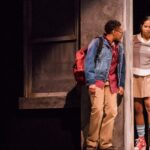
Trying to make it through high school unscarred is difficult, but trying to balance it while discovering one’s sexuality can feel impossible. That’s the story of Kia and Marisol, who struggle to find acceptance in an intolerant community in Chisa Hutchinson’s She Like Girls – the Department of Theatre’s latest production, running now through October 28.
The department strives to produce new plays from diverse playwrights in its seasonal productions. Selecting Hutchinson’s work – she’s an acclaimed new African-American playwright – furthered that goal says director, Eve Muson, who chose the play, in part, to fit her students.
“We have a strong, talented, vibrant group of African-American actors. It felt right to give them the opportunity to play roles that they could absolutely play and audition for after graduation, as they pursue their acting careers.”
“It Makes You Think”
She Like Girls addresses sensitive themes of sexual orientation, community, domestic violence, and hate crimes. Muson relayed that the intention in staging this production on campus is to prompt discussion of these issues and give voice to students, faculty, and others to speak openly and mediate a conversation.
As a coming of age story, “this play speaks to a topic that directly interests our students. It’s also a coming out story and I felt like it was also relevant,” says Muson.
“This play offers up some very key, heartwarming moments that a variety of people can resonate with. It’s an interesting commentary on poverty, sexuality, language, misogyny and bullying,” said Majenta Thomas (Kia), a sophomore acting major. “It makes you think about being better to those around you, which has a place on a college campus, and honestly, everywhere.”
“I think the most important part about playing Marisol is that she is ferociously herself,” says Maria Marsalis, a junior acting major.
Both characters struggle to maintain their secret love to protect their safety.
Much of Muson’s research for the production focused on discovering more about the central character Kia and her world. Muson researched the life of Sakia Gunn, the teenager on whom this story is based, who was stabbed to death by a group of men after telling them that she was a lesbian in an effort to stop their harassment at the Newark train station. Her death was greatly overshadowed by Matthew Shepard’s story. Her world was the city and culture of Newark, New Jersey; Muson wanted to understand how it could impact a young woman.
Interrogating Language
Another part of discovering the “world” of the play was investigating playwright Chisa Hutchinson’s use of language. Language coaches Lynn Watson and Gerrard Taylor were brought into the rehearsals to assist with this process, training actors in the specific dialect and accent needed to fit with the story.
Although the language of the play can be offensive to some, Muson was ready to challenge the audience: “I love that the play interrogates language.”
The actors were faced with the challenge of using racial epithets and slurs throughout the play. But through the process of working under the direction of Muson relayed that “reclaiming the hateful language is the characters’ way to strengthen bonds as community.”
– Justine Cataneo ’19
Photos by Marlayna Demond ’11 for UMBC Magazine.





